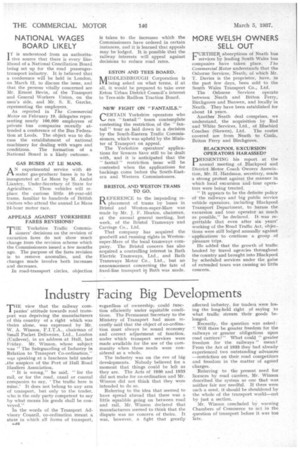Industry Facing Big Developments
Page 66

If you've noticed an error in this article please click here to report it so we can fix it.
THE view that the railway companies' attitude towards road transport was depriving the manufacturers of this country of a right which was theirs alone, was expressed by Mr. W. A. Winson, F.I.T.A., chairman of Small Packet Deliveries, Ltd., London (Unilever), in an address at Hull, last Friday. Mr. Winson, whose subject was "The Safeguarding of Industry in Relation to Transport Co-ordination," was speaking at a luncheon held under be auspices of the Port of Hull Road Hauliers Association.
" It is wrong," he said, " for the rail, or for the road, canal or coastal companies to say, ' The traffic here is mine.' It does not belong to any arm of transport, but only to the trader, who is the only party competent to say by what means his goods shall be conveyed."
In the words of the Transport Advisory Council, co-ordination meant a state in which all forms of transport, • .4.R regardless of ownership, could function efficiently under equitable conditions. The Permanent Secretary to the Ministry of Transport had more recently said that the object of co-ordination must always be sound economy and correct adjustment of function, under which transport services were made available for the use of the community when those needs were considered as a whole.
The industry was on the eve of big developments. Nobody believed for a moment that things could be left as they are. The Acts of 1930 and 1933 did not make for co-ordination and Mr. .Winson did not think that they were intended to do so.
Referring to the idea that seemed to have spread abroad that there was a little squabble going on between road and rail, Mr. Winson declared that manufacturers seemed to think that the dispute was no concern of theirs. It was, however, a fight that greatly affected industry, for traders were losing the long-held right of saying to what traffic stream their goods belonged.
Recently, the question was asked: '-! Will there be greater freedom for the railways or greater obligations upon road carriers?" What could " greater freedom for the railways" mean? From the Act of 1933 they had already experienced two outstanding advances ----restriction on their road competitors and freedom in the matter of agreed charges.
Referring to the present need for licences by road carriers, Mr. Winson described the system as one that was neither fair nor needful. If there were such a need, it should be shouldered by the whole of the transport world—not by just a section. . Mr. Winson concluded by warning Chambers of Commerce to act in the question of transport before it was too late.




































































































